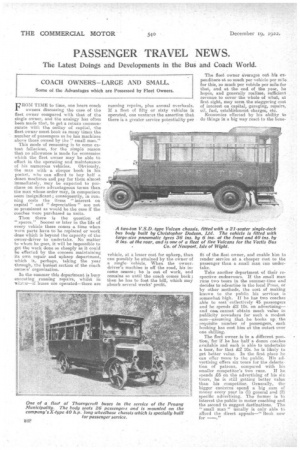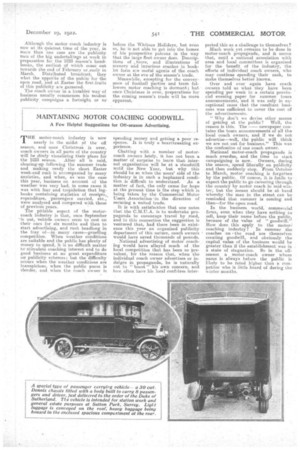PASSENGER TRAVEL NEWS.
Page 14

Page 15

If you've noticed an error in this article please click here to report it so we can fix it.
The Latest Doings and Developments in the Bus and Coach World.
COACH OWNERS—LARGE AND SMALL.
Some of the Advantages which are Possessed by Fleet Owners.
FROM TIME to time, one hears coach owners discussing tho case of the fleet owner compared with that of the single owner, and the analogy has often been made that, to get a return commensurate with the outlay of capital, the fleet owner must book as Many times the number of passengers as he has machines above those owned by the ' small man."
This mode. of reasoning is to some extent fallacious, for the simple reason that no .allowance is made for economies which the fleet owner may be able to. effect in the operating and maintenance of his numerous vehicles. Obviously, the man with a cheque book in his pocket, who can afford to buy half e dozen machines and pay for them almost immediately, may be expected to purchase on more advantageous teems than the man whose order may, in comparison seem insignificant; consequently, in running costs the items " interest on capital " and " depreciation " are not so prominent as would be the ease if the CORCIMS were purchased as units.
Then there is the question of " spares." Sooner or later in the life of every vehicle there comes a time when worn parts have to be replaced or work done which is beyond the capacity of the owner-driver to undertake. No matter to whom he goes, it will be impossible to get the work done so cheaply as it could be effected by the concern maintaining its awn repair and upkeep department, which is, perhaps, taking the year through, the busiestsection of the coach ownees organization.
In the summer this department is busy executing . running repairs, whilst in ei let er—if buses are operated—there are
running repairs, plus anneal overhauls. If a fleet of fifty or sixty vehicles is operated, one ventures the assertion that there is a greater service potentiality per
vehicle, at a lesser cost. for upkeep, than can possibly be attained by the owner of a single, vehicle. When the ownerdriver's machine is off the road, his income ceases; he is out of work, and remains so until the coach comes back; then he has to foot the bill, which may absorb several weeks' profit. The fleet owner averages out leis expenditure at so much per vehicle per mile for this, so much per vehicle per mile for that, and at the end of the year, he hops, and generally realiies, sufficient revenue to cover the whole of what, at first sight, may seem the staggering cost of interest on capital., garaging, repairs, oil, fuel, establishment charges, etc.
Economies effected by his ability to do things in a big way react to the bene fit of the fleet owner, and enable him to render service at a cheaper cost to the passenger than a small man can undertake.
Take another department of their respective endeavours. If the small man runs two tours in the summer-time and decides to adeertise in the local Press, or by other methods, the cost of making known to the public his services is somewhat high. If he has twe 'coaches able to seat -collectively 45. passengers and he spends £2 10e. on advertising— and one% cannot obtain much value in publicity nowadays for such a modest sum—assuming that ho books up. the requisite number of passengers, each booking has cost him at the outset over one shilling.
The fleet owner, is in a different post. tion,–for if he has half a dozen coaches availa;ble and each is able to undertake
a tour, for that Ms. he is likely to get better value. In the first place he can offer more to the public. His advertising offers six tours for the delectation of patrons, compared with his
smaller competitor's two runs. If he spends £5 on the advertising of his six tours, he is still getting better value than his competitor. -Generally, the bigger con-cerns spend a big mum of money every year in (1) general and (2) specific advertising. The former is to interest the public in motor coaching and the second to suggest destinations. The " small man " usually is only able to afford the direct appeals—"13eok now for—," Although the motor coach industry is now at its quietest time of the year, in more than one case are the publicity men of the big undertakings at work in preparation for the 1923 aeaeon's handbooks, the earliest of which came out towards the end of February or .early in March. Distributed broadcast, they whet the appetite of the public for the open road, and at Easter the first-fruits of this publicity are garnered.
The coach owner in a humbler way of business usually commences his modest publicity, campaigns a fortnight or so.
before the Whitsun Holidays, hut even so, he is not able to get into the homes of his prospective patrons in the way that the large fleet owner does. Descriptions of tours, and illustrations of scenery and luxurious coaches in booklet form are useful agents of the coach. owner at the eve of the season's trade.
'Meanwhile, excepting for the conveyance of football parties and team followers motor coaching is dormant; but once Christmas is over, preparations for the corning season's trade will be more apparent.
MAINTAINING MOTOR COACHING GOODWILL.
A Few Helpful Suggestions for Off-season Advertising.
THE motor-coach industry is now nearly in the midst of the off season, and once Christmas is over, coach owners in all parts of the country will be dimly visualizing their plans for the 1923 season. After all is said, clearing-up following the summer trade and making ready the short Easter week-endrush is accompanied by many anxieties, and when, as • was the case this year, business on account of the weather was very bad, in some cases it was with fear and trrpiclation that logbooks containing statistics of receipts, expenditure, passengers carried, etc,° were analysed and compared with those of previous years.
The pitiable aspect of the motorcoach industry is that., once September -is out, vehicle owners seem to rest on their oars for six months and then to start advertising, and rush headlong in the fray of—in many cases—gruelling competition. When weather conditions are suitable and the public has plenty of money to spend, it is no difficult matter to-stimulate coaching interest and to do good businessat no great expenditure on publicity schemes; but the difficulty occurs when the weather conditions are inauspicious, when the public purse is slender, and when the coach owner is spending money and getting a poor response. It is truly a heartbreaking experience.
Chatting with a number of motorcoach owners lately, it has not been a matter of surprise to learn that, internal organization will be at a standstill until the New Year, but why this ahould be so when the users side of the industry is in such a haphazard condi tion -is difficult to understand. As a matter of fact, the only cause for hope at-the present time is the step which is being taken by the Commercial Motor Users Association in the direction of securing a united trade.
It is with satisfaction that one notes that the C.M.U.A. is to undertake propaganda to encourage travel by road, and in this connection the suggestion is ventured that, had there been in existence this year an organized publicity department of this nature, coach owners would have saved thousands of pounds.
National advertising of motor coaching would have allayed much of the local competition that has been so prevalent, for the reason that, when the individual coach owner advertises or indulges in propaganda, he is naturally out to " boost " his own concern, and how often have his local confreres inter
preted this as a challenge to themselves ? Much work yet remains to be done in motor-coach propaganda, and it seems that, until a national association with area and local committees is organized for the benefit of the industry, the
efforts of individual coach owners, who may continue spending their cash, to make themselves better known.
Over and over again have coach owners told us what they have been spending per week in a certain provin cial evening paper for summer tours announcements, and it was only in ex ceptional cases that the resultant business was sufficient to cover the cost of the advertisements.
" Why don't we devise other means of getting at the public ? Well, the reason is this. The — newspaper con tains the tours announcements of all the -local coach owners, and if we do not advertise—well, the public will think we are not out for business." This was the confession of one coach owner.
National motor-coach propaganda is much overdue, and the time to start campaigning is now. Owners, during the season, spend liberally on publicity and then suddenly stop. From October
to March, motor coaching is forgotten by the public. Of course, it is futile to expect the public to go careering through the country by motor coach in mid-winter, but the means should be at hand whereby the man in the street can be reminded that summer is coming and then—for the open road.
In the business world, commercial firms, even when they have nothing _to sell, keep their name before the public, because of the value of " goodwill." How does this apply to the motor= coaching industry ? In summer the coaches on the road are themselves creating goodwill, and obviously the
capital value of the business would be greater than if the establishment was in
a state of stagnation. Si) in the offseason a .motor-coach owner whose name is always before the public is likely to be rated higher than a. competitor who is little heard of during the winter months.




























